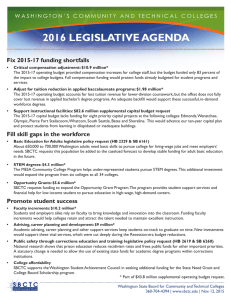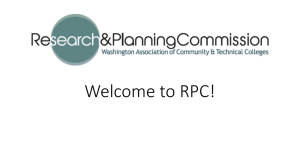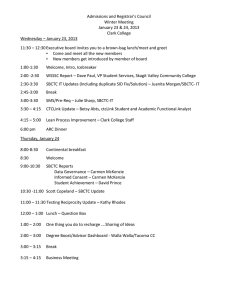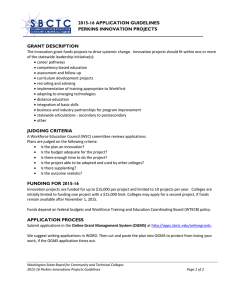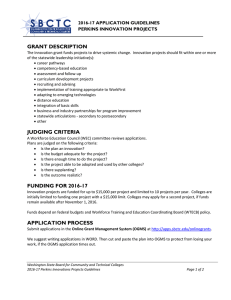RESEARCH & PLANNING COMMISSION RESOURCES FOR MEMBERS Version 1.7 – October 2014
advertisement
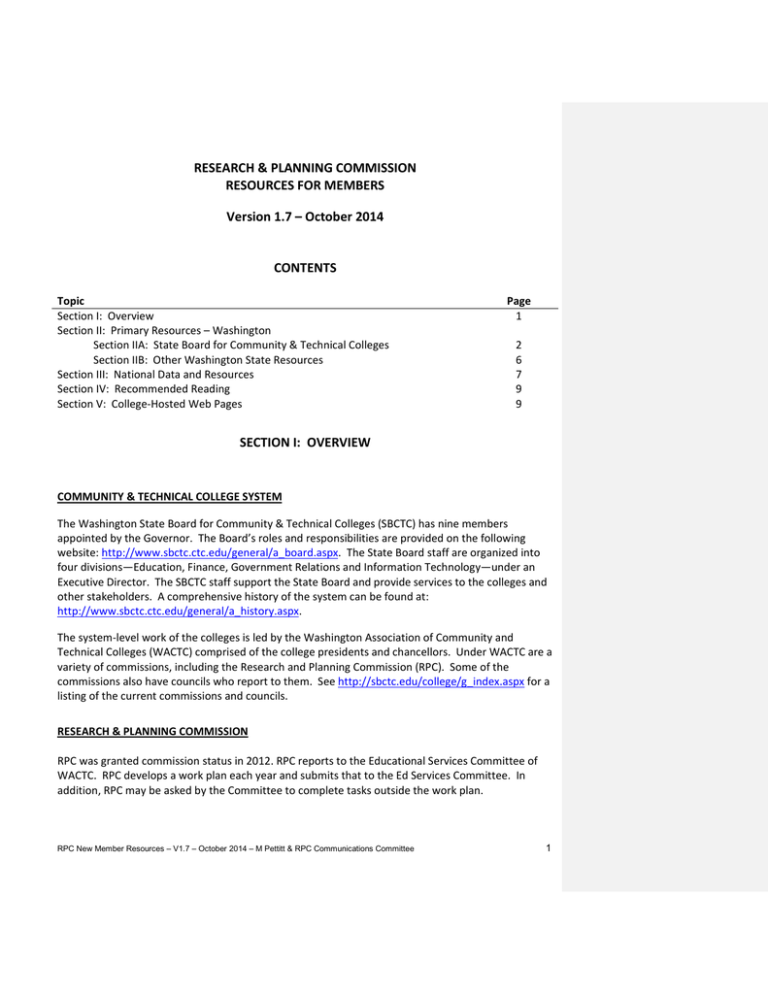
RESEARCH & PLANNING COMMISSION RESOURCES FOR MEMBERS Version 1.7 – October 2014 CONTENTS Topic Section I: Overview Section II: Primary Resources – Washington Section IIA: State Board for Community & Technical Colleges Section IIB: Other Washington State Resources Section III: National Data and Resources Section IV: Recommended Reading Section V: College-Hosted Web Pages Page 1 2 6 7 9 9 SECTION I: OVERVIEW COMMUNITY & TECHNICAL COLLEGE SYSTEM The Washington State Board for Community & Technical Colleges (SBCTC) has nine members appointed by the Governor. The Board’s roles and responsibilities are provided on the following website: http://www.sbctc.ctc.edu/general/a_board.aspx. The State Board staff are organized into four divisions—Education, Finance, Government Relations and Information Technology—under an Executive Director. The SBCTC staff support the State Board and provide services to the colleges and other stakeholders. A comprehensive history of the system can be found at: http://www.sbctc.ctc.edu/general/a_history.aspx. The system-level work of the colleges is led by the Washington Association of Community and Technical Colleges (WACTC) comprised of the college presidents and chancellors. Under WACTC are a variety of commissions, including the Research and Planning Commission (RPC). Some of the commissions also have councils who report to them. See http://sbctc.edu/college/g_index.aspx for a listing of the current commissions and councils. RESEARCH & PLANNING COMMISSION RPC was granted commission status in 2012. RPC reports to the Educational Services Committee of WACTC. RPC develops a work plan each year and submits that to the Ed Services Committee. In addition, RPC may be asked by the Committee to complete tasks outside the work plan. RPC New Member Resources – V1.7 – October 2014 – M Pettitt & RPC Communications Committee 1 Mission/Vision/Bylaws RPC is an organization of institutional research professionals, engages in applied community college research, and adds value to the Community and Technical College (CTC) system through efforts in the following Mission Areas: Mission Area 1: Providing applied research and analysis services to the Washington Association for Community and Technical Colleges (WACTC) and the various Commissions, Councils, committees and task forces within the WACTC structure; Mission Area 2: Collaborating with the SBCTC to improve the availability and quality of data and to support college accountability and performance efforts; Mission Area 3: Supporting and encouraging the professional development of RPC members. The Vision Statement and Bylaws of RPC can be found at: http://sbctc.edu/college/g_rpc.aspx. Listserv There are two research and planning-related mail-lists (i.e., listserv). The first is the WARP listserv, established some years ago, which is open but used sporadically. The second is the closed “researchers” listserv. You must serve in an institutional research/planning/effectiveness capacity at an institution in the system to join this listserv. Requests sent to SBCTC to join the researchers listserv must be approved by the RPC executive committee before they are granted. Data Warehouse distributions are delivered through the researchers listserv. This listserv is also the primary place RPC members post their research related questions, announcements, or discussions. Directions for subscribing to a system listserv are found on the SBCTC website: http://www.sbctc.ctc.edu/docs/collegeaccess/it/_m-mailman-index.aspx. SECTION II: PRIMARY RESOURCES - WASHINGTON SECTION II.A: WASHINGTON STATE BOARD FOR COMMUNITY & TECHNICAL COLLEGES SBCTC WEBSITE In addition to the Research section of the SBCTC website (http://sbctc.edu/college/d_index.aspx), the Educational Services section of the SBCTC website is a good resource for getting background information about such topics as Achieving the Dream, Assessment/Teaching/Learning, Common Course Numbering, High School/College Programs, Integrated Basic Education and Skills Training (IBEST), transfer and articulation agreements, and workforce education (http://sbctc.edu/college/e_index.aspx). Information about Running Start is under the Student Services webpage (http://sbctc.edu/college/s_runningstart.aspx),and information about fees and waivers can be found on the Finance webpage (http://sbctc.edu/college/f_tuition.aspx). RPC New Member Resources – V1.7 – October 2014 – M Pettitt & RPC Communications Committee 2 Comment [PE1]: Added by me on 4/18/14 DATABASES The SBCTC obtains local data from the college’s management information system (MIS) using production jobs that extract and edit data, including data related to students, courses, completions, financial aid, transcripts, student achievement, and human resources. The SBCTC uses this data to create system-level MIS data files for system research purposes and college-level data warehouse files. The documentation for these data files is provided on the SBCTC website at: http://www.sbctc.ctc.edu/college/_d_datawarehouse.aspx. Data Linking for Outcomes Assessment (DLOA) The is a database compiled on annual basis to meet college and SBCTC needs for data related to employment and further education of college students. The DLOA includes data for completers and leavers of vocational, academic, worker retraining or apprenticeship programs who left the system during the academic year. Because the data follows students nine months after leaving the college and links to the Unemployment Insurance data, the database is available to colleges generally 18 months after the end of an academic year. Student Achievement (SA) The SA database is derived from the data warehouse so that a college can measure the “momentum points” earned by students—both pre-college and college level—during the academic year. The database also allows colleges to analyze student progress in order to develop strategies that support student progress and completion. In addition to the points earned, student characteristics and demographics are included in the database. Student Achievement Cohort Database/Achieving the Dream (ATD) Evaluation Tool In addition to the SA database that looks primarily at points earned by students in individual years, the Student Achievement Cohort database looks at several short- and long-term measures using the SA points. This database also serves as the basis for the ATD Evaluation Tool containing pivot tables which allow colleges to disaggregate student achievement by cohorts and student characteristics. The data tool can be downloaded from http://www.sbctc.ctc.edu/college/_e-achieving-the-dreamresources.aspx (college access only). Governance Institute for Student Success (GISS) The Governance Institute for Student Success (GISS) was developed by the Association of Community College Trustees (ACCT) and Student Success Initiatives (SSI) in the College of Education at the University of Texas at Austin (UT), with funding from the Bill & Melinda Gates Foundation. As part of this initiative, launched in Washington in June 2011, the State Board provides a set of cohort data for the trustees for each community and technical college and for the system. The data is derived from the student achievement cohort database. Colleges are provided with the updated annual figures following the presentation to the trustees each summer. The data tracks the achievement of fall cohorts over a four year period. RPC New Member Resources – V1.7 – October 2014 – M Pettitt & RPC Communications Committee 3 Mutual Research Transcript Exchange (MRTE+) The Mutual Research Transcript Exchange (MRTE+) data system is a SQL Server database containing de-identified unit record student enrollment records across the Washington public higher education system. Each student enrolled in higher education is included in the dataset and is assigned one unique encrypted identifier. This identifier creates the link between the community and technical colleges and the universities and allows for longitudinal tracking of the student across the systems. More information on MRTE+ can be found on the SBCTC website at http://www.sbctc.ctc.edu/college/d_MRTE.aspx. REPORTS & DATA TABLES Academic Year Reports/Fall Enrollment & Staffing Reports Academic Year Reports and Fall Enrollment & Staffing Reports include both system and college-level data for a variety of factors related to enrollments, student characteristics, staffing and finance. Both reports are available at http://sbctc.edu/college/d_annual-reports.aspx. These reports currently go back approximately 18 years. Student-Faculty Ratio (SFR) Each quarter and at the close of the academic year, SBCTC calculates the Student-Faculty Ratio (SFR) for each college and the system based on CIP clusters. The pivot tables and summaries in Word documents go back to the 2000-01 academic year: http://sbctc.edu/college/d_studentfaculty.aspx. eLearning Data The State Board compiles data for eLearning enrollments each year. The data include FTE and Headcount data for individual colleges by funding source and type of eLearning format (http://sbctc.edu/college/d_elearningdata.aspx). Other Reports The SBCTC conducts research on a variety of topics and posts research reports on their website: http://sbctc.edu/college/d_research-reports.aspx. In some cases--for example, students of color— research has been conducted on a regular basis and reports on the website back to the 1990s are available electronically. Periodically, the system engages in a study of the economic impact of the state’s community and technical colleges. The most recent report is available at http://sbctc.edu/college/d_EMSI.aspx. RPC New Member Resources – V1.7 – October 2014 – M Pettitt & RPC Communications Committee 4 CODING & DEFINITIONS Data Warehouse Coding & Data Dictionary The primary source of definitions for the Data Warehouse files can be found at http://www.sbctc.ctc.edu/college/_d_datawarehouse.aspx. There are also coding guidelines at http://sbctc.edu/college/_d_datacoding.aspx. The State Board staff have conducted coding workshops in recent years that were extremely helpful, including an overview of student coding (http://www.sbctc.ctc.edu/docs/datareporting/2009decstudent-coding-workshop.pdf), one focused on workforce coding (www.sbctc.ctc.edu/college/workforce/StudentCodingWorkshop.pptx), and a coding workshop in February 2013 in support of the revised Student Achievement Initiative metrics (www.sbctc.ctc.edu/college/education/SAI_Coding_000.pptx).For those interested in understanding how the student management system works at the ground level, try the SM_SMIS Reporting Documentation (http://sbctc.edu/college/_d_misreporting.aspx), or the SMS Overview document (http://www.sbctc.ctc.edu/college/it/smsoverview.pdf). Classification of Instructional Programs (CIP) Codes Every course has a six character CIP code which places it into a subject area with other similar courses. The federal government issues CIP codes and they are updated periodically. For the purposes of reporting, SBCTC often uses CIP clusters, a two-digit code which groups CIP codes together by subject area. Information on CIP codes can be found at: http://sbctc.edu/college/_ewkforceproftechprograms.aspx#cip. CALENDARS MIS Reporting Calendar: Due dates for running the final reports for each quarter are found at http://sbctc.edu/college/_d_misreporting.aspx. Instructional Calendar: A listing of the instructional calendar for each of the colleges is also found at: http://www.sbctc.ctc.edu/general/c_instructional_calendar.aspx. Integrated Postsecondary Education Data System (IPEDS): The submission of data to the federal data reporting system for higher education is the responsibility of the individual institutions, but the State Board provides a significant amount of support for reporting, trouble-shooting, and locking down IPEDS data. The calendar and additional support information can be found at: http://sbctc.edu/college/_d_ipedsreporting.aspx. SBCTC Updates: · · Enrollment and Allocation Monitoring Reports: (Compiled by Research, approved and distributed by Finance) - Compiled quarterly and released approx. one month after MIS finals. Student Achievement Course Survey: (Research) RPC New Member Resources – V1.7 – October 2014 – M Pettitt & RPC Communications Committee 5 · · · · - This task requires reviewing and updating the pre-college math and English and college technical English course listings that are used in awarding points for SAI. - Sent to college researchers annually in the summer and due by August 31st. Course Completion Rates: (Data Services) - Compiled quarterly Student Faculty Ratios: (Data Services) - Compiled quarterly Academic Year Report: (Research) - Full report is available (posted online) by December Fall Quarter Report: (Research) - Full report is available (posted online) by March SECTION II.B: OTHER WASHINGTON STATE RESOURCES Education Research & Data Center (ERDC) The ERDC, housed in Washington’s Office of Financial Management (OFM) oversees the P20W Education Data Project which provides users with data about students in Washington State, including their educational and workforce experiences, and performance over time. The ERDC homepage is: http://www.erdc.wa.gov/default.asp. The P-20 Feedback Reports can be accessed at http://www.erdcdata.wa.gov/. At this webpage you can get reports for school districts, high schools and higher education institutions. If you can’t find what you need, a data request form is available. The BERC Group The BERC Group is an independent consulting firm based in Bothell, focusing on Washington education. Among other data, BERC publishes college attendance, persistence, and graduation data available at: http://www.collegetracking.com/. Customized reports can be requested at the College & Careers page: http://www.bercgroup.com/college-and-career.html. Employment Security Department (ESD) The State's Employment Security Department maintains extensive web pages with information about employment, wages, and the labor market (by geographic area and by industry), and occupational information. ESD's home page can be accessed at http://www.esd.wa.gov. Career Bridge is Washington's one-stop source for career and education planning. The URL is http://www.careerbridge.wa.gov/. Office of Financial Management (OFM) The Office of Financial Management provides vital information, fiscal services and policy support that the Governor, Legislature and state agencies need to serve the people of Washington State. The tabs “Population” and “Research Data” are the most relevant for IR work: http://www.ofm.wa.gov/. RPC New Member Resources – V1.7 – October 2014 – M Pettitt & RPC Communications Committee 6 Office of the Superintendent of Public Instruction (OSPI) OSPI maintains a web site with a variety of information about the K-12 system in the State. The home page URL is http://www.k12.wa.us/. Researchers and planners may be most interested in OSPI's data administration page: http://www.k12.wa.us/dataadmin/. Workforce Training and Education Coordinating Board (WTECB) The WTECB is a state agency that works in partnership with business, labor, local workforce development councils, and other state agencies to address the workforce development challenges facing the State's employers and workers. The homepage is located at: http://www.wtb.wa.gov/. Scroll down the left side of the home page to access the Job Training Results link with information about specific program info by college and region. If you go to Publications, you will find reports and information about major workforce projects and plans. RPC New Member Resources – V1.7 – October 2014 – M Pettitt & RPC Communications Committee 7 SECTION III: NATIONAL RESOURCES & DATA UNITED STATES GOVERNMENT Bureau of Labor Statistics (BLS) The home page of the BLS includes lots of information of interest to researchers and planners. A U.S. map at the bottom of the page allows you to look at data by region and a drop-down menu to look at information by state. The link at the top of the page "Get Detailed Statistics" takes you to a lengthy list of pre-determined employment statistics where you can access most requested statistics and even create customized tables. The BLS home page URL is http://www.bls.gov/home.htm. Census Bureau The main page of the Census Bureau is www.census.gov/. Links here include Quick Facts for states and counties, and American FactFinder, a web page with a wealth of information from the Census Bureau with drop-down menus for getting quick tables and comparison tables. The American FactFinder URL is http://factfinder2.census.gov/. The Census Bureau website also includes the American Community Survey - an ongoing survey that provides data every year -- giving communities the current information they need to plan investments and services. The URL is https://www.census.gov/acs/www/. National Center Educational Statistics (NCES) NCES is home to all the data collected by the Department of Education. A good place to start is the "Annual Reports" web page (http://nces.ed.gov/annuals/). Education Statistics at a Glance brings together data from several NCES sources including The Condition of Education, The Digest of Education Statistics, and Projections of Education Statistics. From the NCES home page (http://nces.ed.gov/index.html) you can link to search engines for facts and tables, reports, and other information compiled by NCES. Reports are generally pdf files which are easily downloaded. NCES/IPEDS Data Center The federal IPEDS submissions by all postsecondary institutions are compiled in a Data Center by the National Center for Education Statistics. The Data Center allows users to retrieve IPEDS data using a variety of functions and selecting variables of interest. The data can then be downloaded. This is not the most user-friendly system ever invented, but there is a 120-page user’s manual available at http://nces.ed.gov/ipeds/datacenter/IPEDSManual.pdf. The National Community College Benchmark Project (NCCBP) NCCBP is the largest, most representative, and comprehensive benchmarking initiative for two-year institutions in the United States. Participating colleges benefit from national and regional reports, peer comparison (it includes information about institutions' enrollment, service area, and demographics to facilitate selection of comparison groups) and best practices tools. Reports include members' benchmark values, percentile ranks, and the 10th, 25th, 50th, 75th, and 90th percentiles of national aggregate data for each benchmark. Benchmarks are broken down under the following RPC New Member Resources – V1.7 – October 2014 – M Pettitt & RPC Communications Committee 8 areas: Completion and Transfer for Full-Time and Part-Time Students, Retention and Persistence, Student Performance, Satisfaction and Engagement, Job Market, and Other Institutional Effectiveness Metrics. Ranking above the 85th percentile on a benchmark is considered an institutional strength. The main website for NCCBP is http://www.nccbp.org/. Participating in NCCBP requires an annual subscription (fee). OTHER USEFUL DATA, POLICY, AND PLANNING RESOURCES ACT In addition to other research activities, the ACT conducts an annual study of student graduation rates. ACT also creates research project reports and information briefs that can be accessed at their Research URL: http://www.act.org/research/ RPC New Member Resources – V1.7 – October 2014 – M Pettitt & RPC Communications Committee 9 American Association of Community Colleges (AACC) The AACC web site, "About Community Colleges," includes some general historical and factual information about community colleges at http://www.aacc.nche.edu/AboutCC/Pages/default.aspx. Topics are listed on the left side of the page regarding trends and statistics, historical information, and fast facts. Association for Institutional Research (AIR) AIR maintains a site with links to IPEDS, NCES, ERIC and other relevant sites for institutional research and planning. Go to http://www.airweb.org/Resources/Links/Pages/IRLinks.aspx. There are also very useful monographs at https://www.airweb.org/EducationAndEvents/Publications/ProfessionalFiles/Pages/default.aspx. Note that most of the AIR publication resources require a membership login. AIR also hosts a great resource for identifying surveys called Measuring Quality in Higher Education: An Inventory of Instruments, Tools and Resources: http://apps.airweb.org/surveys/. AIR has also posted a Code of Ethics and Professional Practice (Code) to provide members of the Association with some broad ethical statements with which to guide their professional lives at https://www.airweb.org/Membership/Pages/CodeOfEthics.aspx. Center for Student Engagement (CCSSE) The majority of Washington Community and Technical Colleges administer the Community College Survey of Student Engagement (CCSSE), a survey from the University of Texas at Austin’s Center for Student Engagement that measures student engagement with their faculty, peers and their coursework. The main website for CCSSE is www.ccsse.org, but chatting with IR colleagues is a good way to find out about survey administration and how colleges have used the survey. Community College Research Center (CCRC) Housed in the Teachers College at Columbia University, the CCRC conducts research about a multitude of factors related to community colleges. CCRC has had significant involvement in Washington State initiatives over the past decade and reports can be accessed at http://www.tc.columbia.edu/ccrc/ Institute for Higher Education Policy (IHEP) The Institute for Higher Education Policy is a non-profit, non-partisan organization whose mission is to foster access to and quality in postsecondary education. The Institute’s activities include research and policy analysis, policy formulation, program evaluation, strategic planning and implementation, and seminars and colloquia. This URL for this site is: http://www.ihep.org/ Institute for International Education (IIE) IIE conducts an annual survey of international education. This includes enrollment of international students in U.S. institutions and U.S. students in study abroad programs. The following URL has links to reports, research and data: http://www.iie.org/Research-and-Publications. National Center for Higher Education Management Systems (NCHEMS) The National Center for Higher Education Management Systems (NCHEMS) is a private nonprofit organization whose mission is to assist colleges and universities as they improve their strategic decision making. The main page for NCHEMS is: http://www.nchems.org/ RPC New Member Resources – V1.7 – October 2014 – M Pettitt & RPC Communications Committee 10 RPC New Member Resources – V1.7 – October 2014 – M Pettitt & RPC Communications Committee 11 National Center for Public Policy and Higher Education As an independent, nonprofit, nonpartisan organization, the National Center prepares actionoriented analyses of pressing policy issues facing the states and the nation regarding opportunity and achievement in higher education-including two- and four-year, public and private, for-profit and nonprofit institutions. The main page for the National Center is: http://www.highereducation.org/ National Institute for Learning Outcomes Assessment (NILOA) National Institute for Learning Outcomes Assessment is a comprehensive website regarding the assessment of student outcomes. In particular, 1) various tests of general education outcomes (http://learningoutcomesassessment.org/tests.htm), and 2) other surveys related to student learning http://learningoutcomesassessment.org/surveys.htm) are valuable resources. National Science Foundation (NSF) The NSF Division of Science has a website that includes surveys, data, and reports about math, science, technology and engineering education. This site is located at http://www.nsf.gov/sbe/srs/start.htm Northwest Commission on Colleges and Universities (NWCCU) Washington colleges are accredited by our regional accrediting agency, the NWCCU. Accreditation is a peer-review process that occurs on a set cycle of reporting, evaluation visits, and review by the Commission. NWCCU communicates with the colleges through the President and the college’s Accreditation Liaison Officer (ALO). Process information, standards and policies are provided on the NWCCU website: http://www.nwccu.org/. Western Interstate Commission for Higher Education (WICHE) The WICHE-member state highlights and profiles are available at the following URL: http://www.wiche.edu/. SECTION IV: RECOMMENDED READING Over the years, AIR has published a number of useful books on the practice of institutional research. Although a number of these publications are now out of print, several are reasonably priced and still available through the AIR website (http://www.airweb.org/EducationAndEvents/Publications/Documents/puborderform.pdf): Effective Reporting, (2nd Edition); by L. Sanders and J. Filkins; 65 pp. (2009) Using Mixed Methods in Institutional Research; edited by R. Howard; 119 pp. (2007) Applications of Intermediate/Advanced Statistics in Institutional Research; edited by M. Coughlin; 214 pp. (2005) People, Processes, and Managing Data (2nd Edition); by G. McLaughlin and R. Howard; 102 pp. (2004) RPC New Member Resources – V1.7 – October 2014 – M Pettitt & RPC Communications Committee 12 The Primer for Institutional Research; edited by W. Knight; 161 pp. (2003) Additional titles on the practice of institutional research are published by Wiley at a 25% discount for AIR members, including the Handbook of Institutional Research ($100 list): http://www.wiley.com/WileyCDA/Section/id-404478.html. SECTION V: COLLEGE-HOSTED WEBPAGES As of the current date, several colleges are hosting webpages of interest to RPC members. They are listed below: http://faculty.whatcom.ctc.edu/InstResearch/IR/Accreditation/Resources/WA-CTCs.html Provides links to all colleges' accreditation reports, strategic plans, student learning outcomes assessment work, institutional research work, program review/improvement work, services review/improvement work, and college learning outcomes. Also, provides a list of colleges' core themes, strategic plan goals, and mission statements (Contact: Anne Marie Karlberg at Whatcom). http://www.skagit.edu/files.asp_Q_pagenumber_E_2485 RPC Accountability/Quality Committee’s short briefs of various programs that assess institutional quality and/or outcomes (Contact: Maureen Pettitt at Skagit). https://docs.google.com/a/email.edcc.edu/spreadsheet/ccc?key=0AmhJLYDyC8ZdDRrMkpCUGpnaW55Ml85UktmM3RfTHc#gid=0 Shared CCSSE benchmark results since 2003 (Contact: James Mulik at Edmonds). RPC New Member Resources – V1.7 – October 2014 – M Pettitt & RPC Communications Committee 13
